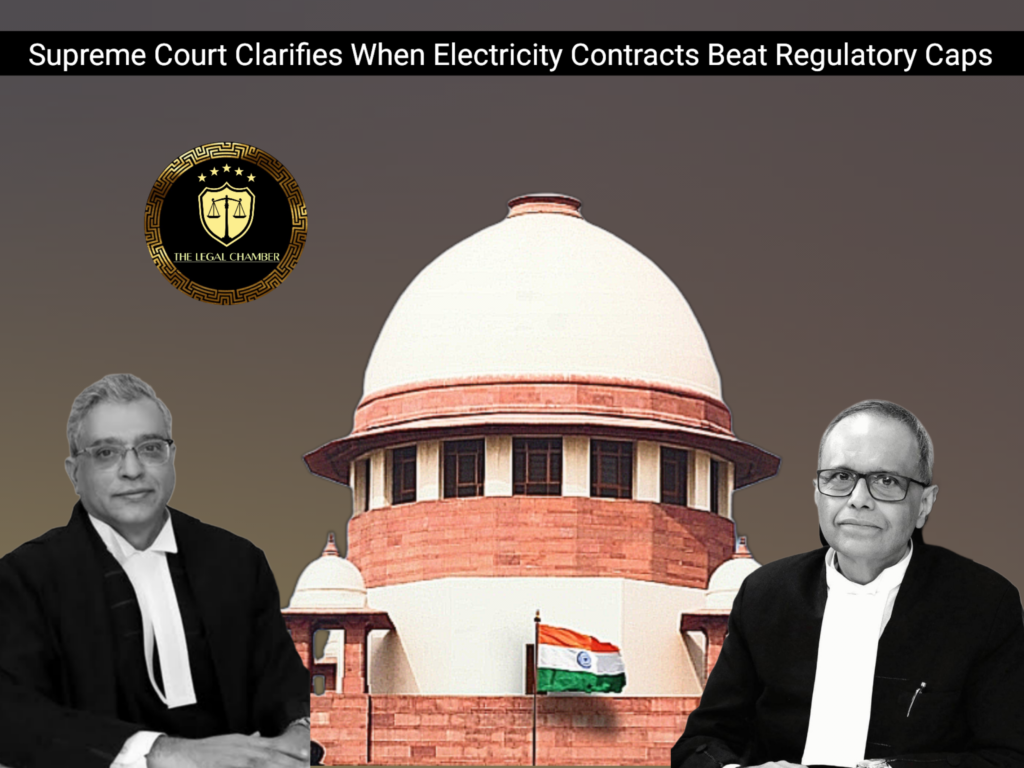
The Supreme Court ruled that Note 3 of Regulation 55 of the CERC Regulations, 2019, which caps free power supply to states at 13%, is only for tariff calculation and does not override contractual obligations under the Implementation Agreement. The Court held that writ jurisdiction was inappropriate, as disputes involving regulatory interpretation must first be addressed by the specialized CERC. The judgment reaffirms that contractual rights remain enforceable unless expressly prohibited by law.
Facts Of The Case:
The case involves a dispute between the State of Himachal Pradesh and JSW Hydro Energy Limited over the supply of free power from a hydroelectric project. In 1993, the state allotted the Karcham Wangtoo Hydroelectric Project to a predecessor company of JSW Hydro under a Memorandum of Understanding (MoU), requiring 12% free power supply. This was later formalized in a 1999 Implementation Agreement, increasing the obligation to 18% after 12 years.In 2019, the Central Electricity Regulatory Commission (CERC) introduced regulations capping free power to states at 13% for tariff calculations. When JSW Hydro’s obligation increased to 18% in 2023, it sought to limit supply to 13%, citing CERC regulations. The state insisted on 18% as per the contract. JSW Hydro approached the High Court, which ruled in its favor, directing alignment with CERC’s cap.The Supreme Court overturned this decision, holding that the CERC’s 13% cap was only for tariff determination and did not invalidate contractual obligations. It emphasized that disputes involving regulatory interpretation should first be resolved by CERC, not writ courts. The Court reinstated the 18% free power requirement under the original agreement, affirming the binding nature of contracts unless expressly overridden by law.
Procedural History:
The dispute originated when JSW Hydro Energy Limited filed a writ petition before the Himachal Pradesh High Court in 2023, seeking to modify its contractual obligation of supplying 18% free power to the state, arguing that the CERC’s 2019 Regulations capped such supply at 13%. The High Court allowed the petition, directing alignment of the Implementation Agreement with the CERC Regulations.The State of Himachal Pradesh appealed to the Supreme Court, challenging the High Court’s jurisdiction and interpretation. The Supreme Court reversed the High Court’s decision, holding that (1) the CERC’s cap was only for tariff calculation, not contractual obligations; (2) the High Court should not have entertained the writ petition since regulatory disputes must first be addressed by the CERC; and (3) the contractual obligation of 18% free power remained enforceable. The Supreme Court’s judgment restored the original terms of the Implementation Agreement.
READ ALSO:Motive vs. Reform : Supreme Court Commutes Death Penalty Despite ‘Beastly’ Murders
Court Observation:
The Supreme Court made several key observations in its judgment. Firstly, it clarified that Note 3 of Regulation 55 of the CERC Regulations, 2019 was meant solely for tariff calculation purposes and did not invalidate or override existing contractual obligations between parties. The Court emphasized that regulatory caps cannot unilaterally modify binding contracts unless expressly mandated by law.Secondly, the Court observed that the High Court had erred in exercising writ jurisdiction, as the dispute primarily involved interpretation of specialized electricity regulations – a matter falling within the exclusive domain of the CERC as the expert regulator. The judgment stressed the importance of maintaining jurisdictional boundaries between constitutional courts and specialized tribunals.Thirdly, the Court noted that the Implementation Agreement represented a negotiated commercial arrangement where free power supply formed part of the consideration for project rights. It held that such mutually agreed terms must be honored unless specifically prohibited by statute. The observations reaffirmed the sanctity of contracts while balancing regulatory objectives under the Electricity Act, 2003.
Final Decision & Judgement:
In its final decision, the Supreme Court allowed the appeal filed by the State of Himachal Pradesh and set aside the Himachal Pradesh High Court’s judgment dated May 28, 2024. The apex court held that JSW Hydro Energy Limited remains contractually bound to supply 18% free power to the state as per the original Implementation Agreement, ruling that the CERC’s 13% cap under Regulation 55 was only applicable for tariff determination purposes and did not invalidate the contractual obligation. The Court emphasized that disputes involving interpretation of electricity regulations should first be adjudicated by the specialized regulator (CERC) rather than through writ petitions, thereby reinforcing the jurisdictional hierarchy under the Electricity Act, 2003. The judgment reinstated the contractual terms while clarifying that regulatory provisions cannot override valid contracts unless expressly stipulated by law. All pending applications were disposed of with no order as to costs.
Case Details:
Case Title: The State of Himachal Pradesh & Anr. vs. JSW Hydro Energy Limited & Ors. Citation: 2025 INSC 857 Appeal No.: Civil Appeal No. 12883 of 2024 Date of Judgment: July 16, 2025 Bench: Justice Pamidighantam Sri Narasimha & Justice Joymalya Bagchi
Download The Judgement Here